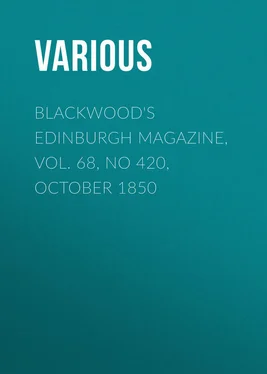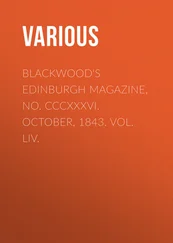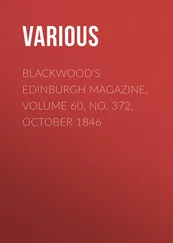Various - Blackwood's Edinburgh Magazine, Vol. 68, No 420, October 1850
Здесь есть возможность читать онлайн «Various - Blackwood's Edinburgh Magazine, Vol. 68, No 420, October 1850» — ознакомительный отрывок электронной книги совершенно бесплатно, а после прочтения отрывка купить полную версию. В некоторых случаях можно слушать аудио, скачать через торрент в формате fb2 и присутствует краткое содержание. Издательство: Иностранный паблик, Жанр: periodic, foreign_edu, Путешествия и география, на английском языке. Описание произведения, (предисловие) а так же отзывы посетителей доступны на портале библиотеки ЛибКат.
- Название:Blackwood's Edinburgh Magazine, Vol. 68, No 420, October 1850
- Автор:
- Издательство:Иностранный паблик
- Жанр:
- Год:неизвестен
- ISBN:нет данных
- Рейтинг книги:4 / 5. Голосов: 1
-
Избранное:Добавить в избранное
- Отзывы:
-
Ваша оценка:
- 80
- 1
- 2
- 3
- 4
- 5
Blackwood's Edinburgh Magazine, Vol. 68, No 420, October 1850: краткое содержание, описание и аннотация
Предлагаем к чтению аннотацию, описание, краткое содержание или предисловие (зависит от того, что написал сам автор книги «Blackwood's Edinburgh Magazine, Vol. 68, No 420, October 1850»). Если вы не нашли необходимую информацию о книге — напишите в комментариях, мы постараемся отыскать её.
Blackwood's Edinburgh Magazine, Vol. 68, No 420, October 1850 — читать онлайн ознакомительный отрывок
Ниже представлен текст книги, разбитый по страницам. Система сохранения места последней прочитанной страницы, позволяет с удобством читать онлайн бесплатно книгу «Blackwood's Edinburgh Magazine, Vol. 68, No 420, October 1850», без необходимости каждый раз заново искать на чём Вы остановились. Поставьте закладку, и сможете в любой момент перейти на страницу, на которой закончили чтение.
Интервал:
Закладка:
Various
Blackwood's Edinburgh Magazine, Vol. 68, No 420, October 1850
MODERN STATE TRIALS. 1 1 Modern State Trials : Revised and Illustrated, with Essays and Notes. By William C. Townsend, Esq., M.A., Q.C., Recorder of Macclesfield. In 2 vols. 8vo. Longman & Co. 1850.
The idea of this work is happily conceived, and carried into effect, in the two volumes before us, with no little judgment and ability. The subject is one interesting, useful, and important; and the author was in many respects well qualified to deal with it by his talents, his accomplishments, his professional acquirements, and his experienced observation. It will be seen that we speak of the author, and of his work, in different tenses; and there is a melancholy significance in the distinction. Within a very few days of his sending to us these two volumes, he died, unexpectedly, in the flower of his age, and just as he had attained an honour which he had long coveted – that of being raised to the rank of Queen's Counsel. On the first day of last Easter term, he presented himself in each of the courts at Westminster, in his "silk" gown, exchanging the customary obeisances with the Judges, the Queen's Counsel, and the great body of his brethren behind the bar, on being formally called by the Lord Chief Justice "to take his seat within the bar, Her Majesty having been pleased to appoint him one of Her Majesty's Counsel." He looked pleasurably excited: alas, how little anticipating that the last day of that same term would see him stripped of his long-coveted insignia, and clothed in the dismal vesture of the grave! For on that day he died, after a brief but very severe illness, in his forty-sixth year. A serious attack of rheumatic fever, several years before, had permanently impaired his physical energies, though not to such an extent as to prevent the exercise of his profession. His practice, till latterly, had been chiefly at the Cheshire and Manchester sessions, from which he gradually rose into considerable business, both civil and criminal, on the North Wales circuit. On being raised to his briefly-held rank, the prospect of a successful career opened before him; for he knew his profession well, as those were aware who were able and disposed to push him forward. During Easter term he was engaged before a committee of the House of Commons, to conduct a case of some importance. This was a lucrative branch of practice, which he was naturally eager to cultivate. Fatigue, anxiety, and excitement induced the return of an old complaint, accompanied by new and somewhat startling symptoms; but though utterly unfit for business, he could not be restrained from attending the committee room, though it was necessary to carry him in a chair up the long flight of steps leading to the corridor in the new House. He was soon, however, obliged to return as he had gone. The palsying hand of Death had touched the aspiring lawyer! After much suffering, he expired on the 8th of May, the last day of Easter term, and on the 13th was buried in the vaults of Lincoln's Inn, of which he had only a few days previously been elected a Bencher! He was a member of Queen's College, Oxford, where he graduated (we believe with honours) in 1824; was called to the bar in 1828; and elected Recorder of Macclesfield in 1833. – As a speaker he was correct and fluent, though not forcible; as an advocate, judicious and successful. He was a man of classical tastes, extensively read in literature, and exceedingly familiar with political history and constitutional law. What he knew he could use readily and effectively, both as a writer and a speaker. He was very industrious with his pen during every interval between his professional engagements; and has left behind him, independently of his contributions to periodical literature, three works – the History of the House of Commons from 1688 to 1832 ; the Lives of Twelve Eminent Judges , and the work now before us. The first of these was published in 1843-4, in two volumes octavo. The author's professed object was to present "a popular history of the House of Commons, with biographical notices of those members who have been most distinguished in its annals; and describing the changes in its internal economy, powers, and privileges," during the space of a hundred and forty-four years elapsing between two memorable periods – the "noble introduction" to Parliamentary Records, "afforded by the Convention Parliament of 1688," and the "eventful close" witnessed in the second Parliament of William IV., which passed "the Reform Bill." This space he subdivided into three distinguishing eras: —
"The first includes a space of thirty-nine years – from the abdication of James to the death of George I. in 1727 – characterised by master spirits, critical events, and stirring debate. The second era – sort of mezzo-termino – comprehends the reign of George II., when men in office were corrupt, and public morals low, and the general topics of discourse resembled parish vestry discussions, but still a prosperous reign – the sound common-sense of Walpole promoting, even by inglorious acts, the national welfare, and Chatham's genius rescuing the age from mediocrity.
"The regular publication of the debates, and troubles in America, usher in the last and most glorious epoch, – the days of North and Burke – of Pitt and Fox – of Windham and Canning – of Tierney, and Brougham, and Peel, – illustrated by oratory enduring as the language, and with memories of statesmen that can never die."
Mr Townsend's second work was published about four years afterwards – viz., in 1848 – also in two volumes, and entitled Lives of Twelve Eminent Judges of the Last and Present Century . These were – Lord Alvanley, Mr Justice Buller, Lord Eldon, Lord Ellenborough, Lord Erskine, Sir Vicary Gibbs, Sir William Grant, Lord Kenyon, Lord Loughborough, Lord Redesdale, Lord Stowell, and Lord Tenterden. This work consisted of memoirs, which the author had previously published in the Law Magazine , where they had attracted considerable attention from the profession; as they contained many interesting and entertaining anecdotes, and information not easily attainable elsewhere. 2 2 Lord Campbell has made considerable use of Mr Townsend's collection, and publicly acknowledged his obligations, in his Lives of the Lord Chancellors and Lord Chief-Justices . It is not impossible that we may, before long, present our readers with an extended examination of these two important works of the new Lord Chief-Justice of the Queen's Bench.
Both of these works are of an entertaining character. They are written in an easy, flowing style – occasionally, however, somewhat loose and gossiping. It must be owned that the author's forte does not lie in the delineation of character, either moral or intellectual. If he really possessed a quick and searching insight into it, he would seem to have felt a greater pleasure in grouping about each individual who was the subject of his pencil the general incidents of his position, than in penetrating his idiosyncrasy, and detecting the operation of those incidents upon it. He does not conceive distinctly of his man , keeping his eye steadily upon him, with a view to the development and exhibition of character; but is apt, if we may be allowed so to speak, to lose him in his life. Still the work is decidedly an acquisition to popular and professional literature, and, equally with its predecessor, evidences the mild and candid temper and character of the author. Thus much we thought it only fair to premise, in justice to the memory of an amiable and accomplished member of the English bar, and a man of letters; one, too, who in his political opinions was a staunch and consistent upholder of those to which Maga has ever been devoted. In no instance, however – in neither of the two works at which we have been thus glancing in passing, nor in that now lying before us – did Mr Townsend suffer his political opinions to bias his judgment, or betray him into the faintest semblance of partiality or injustice.
Интервал:
Закладка:
Похожие книги на «Blackwood's Edinburgh Magazine, Vol. 68, No 420, October 1850»
Представляем Вашему вниманию похожие книги на «Blackwood's Edinburgh Magazine, Vol. 68, No 420, October 1850» списком для выбора. Мы отобрали схожую по названию и смыслу литературу в надежде предоставить читателям больше вариантов отыскать новые, интересные, ещё непрочитанные произведения.
Обсуждение, отзывы о книге «Blackwood's Edinburgh Magazine, Vol. 68, No 420, October 1850» и просто собственные мнения читателей. Оставьте ваши комментарии, напишите, что Вы думаете о произведении, его смысле или главных героях. Укажите что конкретно понравилось, а что нет, и почему Вы так считаете.












